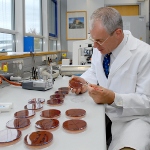You are here:
Bacteria

Bacteria are microorganisms which are composed of one single cell. They occur everywhere in our body and in the environment. As opposed to viruses, bacteria can multiply themselves. They divide in the middle and constitute autonomous cells. This is referred to as bacterial growth or bacterial multiplication.
Useful bacteria can become dangerous, too
Many bacteria are vital for humans, like those which prevent a multiplication of pathogens. However, in some cases even useful bacteria can become pathogens and cause an infection. These infections are possible in humans with a weakened immune system or if bacteria penetrate our body e.g. through wounds.
This is often the case for zoonoses, i.e. for pathogens which are transmitted from animals to humans.
What does BfR do?
BfR assesses risks which are caused by damaging bacteria in foods. Bacteria can reach foods through environmental contaminants, poor hygiene and microorganisms from agriculture and more. Such microbial pathogens, which are transmitted from animals via foods to humans, are referred to as zoonotic agents. Diseases which can be transmitted from animals to humans are consequently referred to as "zoonoses".
Analyses and risk assessments at BfR focus on the following bacterial species/zoonotic agents. They cause the classical symptoms of foodborne diseases: nausea, diarrhoea and vomiting
- Acrobacter spp.
- Bacillus cereus
- Campylobacter spp.
- Clostridia
- Coxiella burnetii
- Escherichia coli
- Enterobacter spp.
- Listeria monocytogenes
- Mycobacteria
- Salmonella
- Staphylococci
- Yersinia
- Vibrio
Many bacteria can develop toxins (toxic substances) and deploy a harmful effect in this way. As far as toxigenic microorganisms are concerned, it is differentiated between bacteria which can develop their toxin already in the food and those who release their toxins only after uptake by humans in the gastrointestinal tract.
Opinion
(8)| Date | Title | Size |
|---|---|---|
|
27.08.2020 Updated BfR Opinion No 037/2020
|
Prevention of Foodborne Illness When Keeping Food Hot |
616.1 KB
|
|
12.04.2019 BfR Opinion No 013/2019
|
Resistant bacteria: Wash uncooked vegetables and lettuce thoroughly and prepare them fresh by yourself |
277.9 KB
|
|
18.06.2018 BfR Opinion No 021/2018
|
Francisella tularensis infections from foods unlikely |
41.1 KB
|
|
10.07.2017 BfR Opinion No. 013/2017
|
Grass and leaf products for consumption may be contaminated with human pathogen bacteria |
64.1 KB
|
|
13.04.2016 BfR Opinion No 008/2016
|
Raw milk: boiling protects against infection with Campylobacter |
40.4 KB
|
|
09.08.2013 BfR Opinion No. 021/2013
|
Melons: Health Hazard through Contamination with Pathogenic Bacteria |
128.8 KB
|
|
05.12.2011 BfR Opinion No. 002/2012
|
ESBL-forming bacteria in foods and their potential transfer to humans |
32.8 KB
|
|
14.04.2011 BfR Opinion No. 001/2012
|
Risk-based meat inspection of fattening pigs without incision |
32.6 KB
|
FAQ
(4)| Date | Title | Size |
|---|---|---|
|
19.02.2025 Updated FAQ at the BfR
|
ESBL- and AmpC-producing bacteria: Antibiotic-resistant bacteria and how to prevent their spread |
271.4 KB
|
|
09.01.2025 BfR FAQ
|
Brucella in food – identifying and avoiding sources of infections |
221.3 KB
|
|
06.09.2024 BfR FAQ
|
Avoiding infections - What should be considered when consuming raw milk? |
255.6 KB
|
|
22.10.2014 BfR FAQ
|
FAQs on anthrax and possible contamination of foods with Bacillus anthracis |
33.9 KB
|
Press releases
(11)Communication
(5)| Date | Title | Size |
|---|---|---|
|
11.10.2019 BfR Communication No 040/2019
|
Milk recall: Questions and answers about the "waterborne bacteria" Aeromonas hydrophila |
153.3 KB
|
|
26.04.2017 BfR Communication 005/2017
|
Transmission of livestock-associated MRSA to humans via poultry meat is possible, but the risk is low |
74.6 KB
|
|
23.12.2016 Updated communication No. 036/2016
|
Antimicrobial Resistance: Carbapenemases-producing bacteria in livestock |
23.6 KB
|
|
22.01.2015 BfR Communication No. 003/2015
|
Antimicrobial Resistance in Livestock and Food - Its Significance for Human Medicine and Options for Action in Risk Management |
44.0 KB
|
|
21.10.2014 BfR communication No 036/2014
|
Anthrax outbreak in Slovakian cattle herd: health hazard to consumers from meat brought into Germany unlikely |
29.1 KB
|
